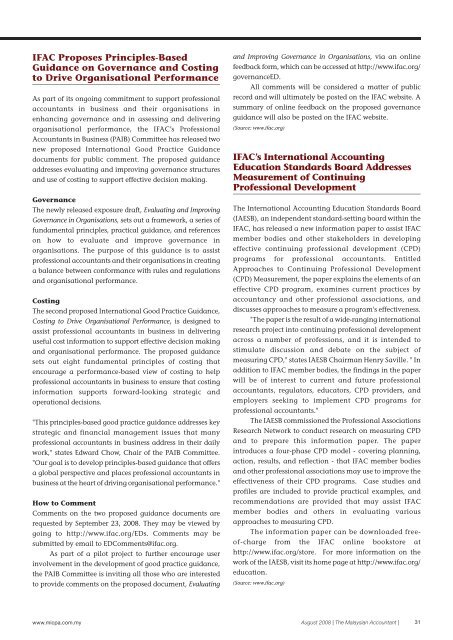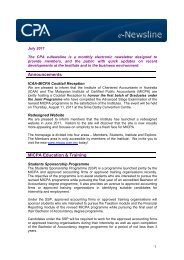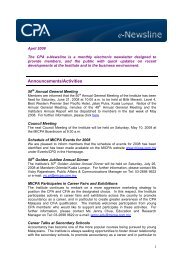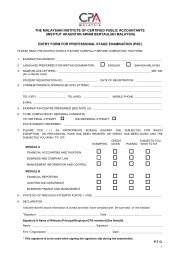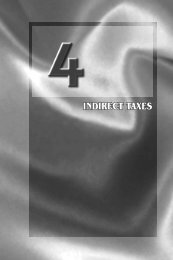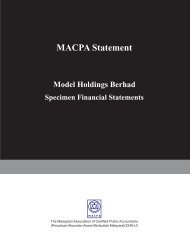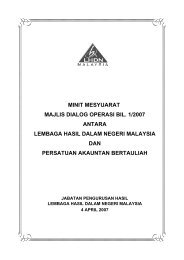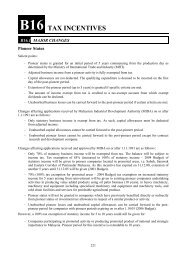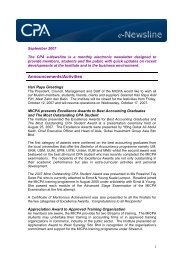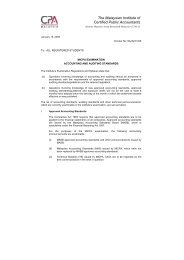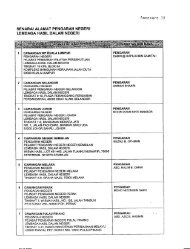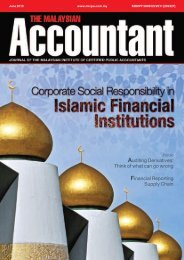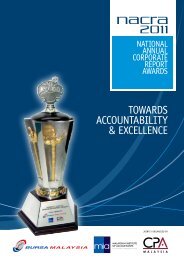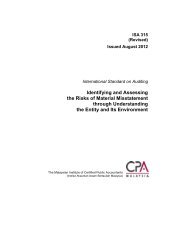november 2008 examination - The Malaysian Institute Of Certified ...
november 2008 examination - The Malaysian Institute Of Certified ...
november 2008 examination - The Malaysian Institute Of Certified ...
You also want an ePaper? Increase the reach of your titles
YUMPU automatically turns print PDFs into web optimized ePapers that Google loves.
IFAC Proposes Principles-BasedGuidance on Governance and Costingto Drive Organisational PerformanceAs part of its ongoing commitment to support professionalaccountants in business and their organisations inenhancing governance and in assessing and deliveringorganisational performance, the IFAC’s ProfessionalAccountants in Business (PAIB) Committee has released twonew proposed International Good Practice Guidancedocuments for public comment. <strong>The</strong> proposed guidanceaddresses evaluating and improving governance structuresand use of costing to support effective decision making.Governance<strong>The</strong> newly released exposure draft, Evaluating and ImprovingGovernance in Organisations, sets out a framework, a series offundamental principles, practical guidance, and referenceson how to evaluate and improve governance inorganisations. <strong>The</strong> purpose of this guidance is to assistprofessional accountants and their organisations in creatinga balance between conformance with rules and regulationsand organisational performance.Costing<strong>The</strong> second proposed International Good Practice Guidance,Costing to Drive Organisational Performance, is designed toassist professional accountants in business in deliveringuseful cost information to support effective decision makingand organisational performance. <strong>The</strong> proposed guidancesets out eight fundamental principles of costing thatencourage a performance-based view of costing to helpprofessional accountants in business to ensure that costinginformation supports forward-looking strategic andoperational decisions."This principles-based good practice guidance addresses keystrategic and financial management issues that manyprofessional accountants in business address in their dailywork," states Edward Chow, Chair of the PAIB Committee."Our goal is to develop principles-based guidance that offersa global perspective and places professional accountants inbusiness at the heart of driving organisational performance."How to CommentComments on the two proposed guidance documents arerequested by September 23, <strong>2008</strong>. <strong>The</strong>y may be viewed bygoing to http://www.ifac.org/EDs. Comments may besubmitted by email to EDComments@ifac.org.As part of a pilot project to further encourage userinvolvement in the development of good practice guidance,the PAIB Committee is inviting all those who are interestedto provide comments on the proposed document, Evaluatingand Improving Governance in Organisations, via an onlinefeedback form, which can be accessed at http://www.ifac.org/governanceED.All comments will be considered a matter of publicrecord and will ultimately be posted on the IFAC website. Asummary of online feedback on the proposed governanceguidance will also be posted on the IFAC website.(Source: www.ifac.org)IFAC’s International AccountingEducation Standards Board AddressesMeasurement of ContinuingProfessional Development<strong>The</strong> International Accounting Education Standards Board(IAESB), an independent standard-setting board within theIFAC, has released a new information paper to assist IFACmember bodies and other stakeholders in developingeffective continuing professional development (CPD)programs for professional accountants. EntitledApproaches to Continuing Professional Development(CPD) Measurement, the paper explains the elements of aneffective CPD program, examines current practices byaccountancy and other professional associations, anddiscusses approaches to measure a program's effectiveness."<strong>The</strong> paper is the result of a wide-ranging internationalresearch project into continuing professional developmentacross a number of professions, and it is intended tostimulate discussion and debate on the subject ofmeasuring CPD," states IAESB Chairman Henry Saville. " Inaddition to IFAC member bodies, the findings in the paperwill be of interest to current and future professionalaccountants, regulators, educators, CPD providers, andemployers seeking to implement CPD programs forprofessional accountants."<strong>The</strong> IAESB commissioned the Professional AssociationsResearch Network to conduct research on measuring CPDand to prepare this information paper. <strong>The</strong> paperintroduces a four-phase CPD model - covering planning,action, results, and reflection - that IFAC member bodiesand other professional associations may use to improve theeffectiveness of their CPD programs. Case studies andprofiles are included to provide practical examples, andrecommendations are provided that may assist IFACmember bodies and others in evaluating variousapproaches to measuring CPD.<strong>The</strong> information paper can be downloaded freeof-chargefrom the IFAC online bookstore athttp://www.ifac.org/store. For more information on thework of the IAESB, visit its home page at http://www.ifac.org/education.(Source: www.ifac.org)www.micpa.com.myAugust <strong>2008</strong> | <strong>The</strong> <strong>Malaysian</strong> Accountant |31


